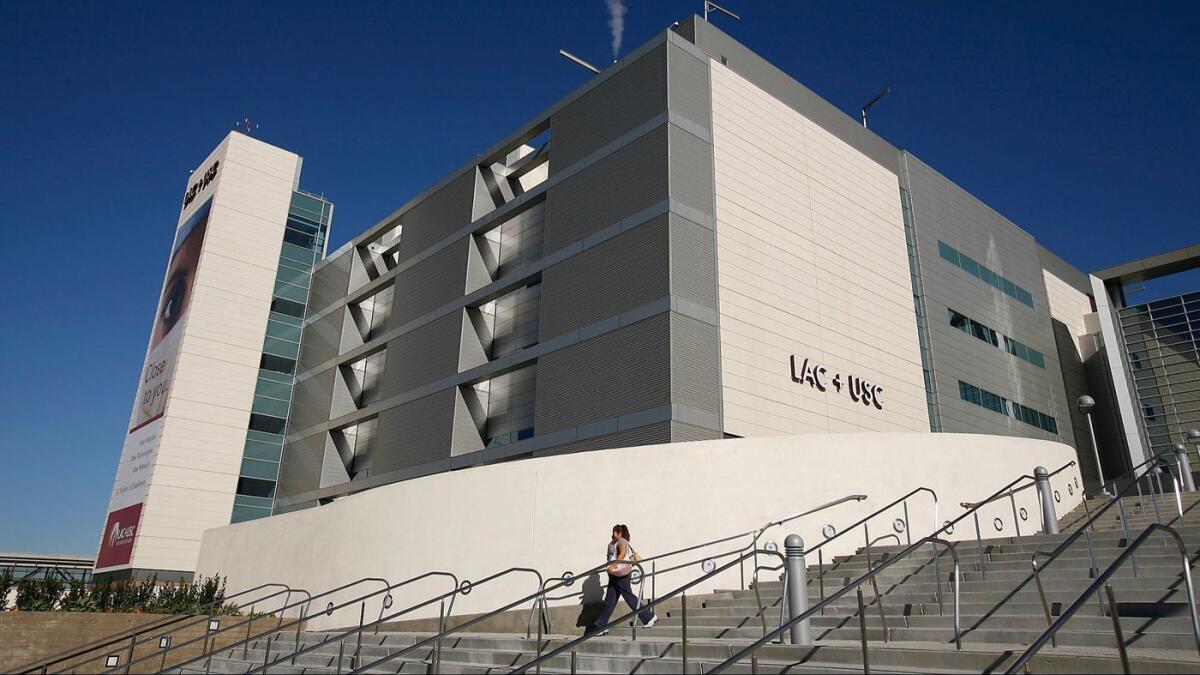UCLA doctor stripped of license, accused of sexually assaulting former County-USC hospital colleagues

A UCLA cardiologist has been temporarily stripped of his medical license after state regulators described him as a “sexual predator” who assaulted three female colleagues when he was working and training at L.A. County-USC Medical Center.
An administrative law judge ruled this week that Dr. Guillermo Andres Cortes “presents a risk of immediate and serious injury to the public” if allowed to continue working as a physician in California.
The state medical board opened an investigation into Cortes in February after The Times detailed a former resident’s accusations that he cornered her in a windowless room at the hospital, reached under her scrubs and sexually assaulted her.
The resident’s complaint prompted the hospital to place Cortes on leave, but the physician was eventually allowed to return to work before the county had finished an investigation. Another woman says he assaulted her at his apartment after she fell asleep. And he was later accused of sexually assaulting another co-worker several times, according to the medical board.
Tomas Guterres, Cortes’ defense attorney, said in a statement that his client “vehemently denies the allegations and charges presented to the medical board.”
Cortes was not properly notified about the medical board’s request to suspend his license and couldn’t properly defend himself against the accusations, the lawyer said. He said Cortes did not supervise the women who made the complaints, adding that they did not notify their superiors or law enforcement in a timely manner.
“Once all of the evidence is presented, Dr. Cortes’ name and reputation will be cleared of these false accusations,” Guterres said in the statement.
Another hearing on whether Cortes’ license should remain suspended is scheduled for June 15. The medical board said it was preparing a formal accusation against Cortes and “seeking additional potential victims.”
The county’s health department, which runs the Boyle Heights public hospital with USC, said administrators took “immediate and appropriate actions” after receiving a complaint alleging that Cortes had subjected a doctor to “inappropriate conduct and sexual harassment” while she was a resident.
A department spokesman declined to elaborate or say whether the hospital alerted the medical board to the accusation.
A UCLA spokesman, Phil Hampton, said late Wednesday that Cortes had been placed on paid leave but did not say when or why. He said the university had not been made aware of the misconduct allegations when Cortes was hired at UCLA Ronald Reagan Medical Center in July 2017.
The medical board’s petition to suspend Cortes’ license contains detailed sworn accounts from the three women but does not identify them. (The Times does not identify alleged victims of sexual assault unless they choose to make their names public.)
One alleged that Cortes assaulted her after they had been drinking together at his apartment in January 2015. She said he tried to kiss her in the pool, but she pushed him away. The woman said she was “very intoxicated” and fell asleep in Cortes’ apartment. Later, she woke up to Cortes raping her, according to her affidavit. She said she reported the incident to the police.
Ten months later, Dr. Meena Zareh said, Cortes sexually assaulted her. Zareh outlined her accusations in The Times’ February report. According to her account, which was included in the medical board’s petition, Cortes summoned her to a private meeting room on the hospital’s fourth floor the afternoon of Nov. 17, 2015, to discuss a patient’s care.
When the discussion ended, she tried to leave, but he stood in the doorway and pushed her arms to her sides, she said. Cortes “untied my scrub pants and forced his hand down into my underwear and inserted his finger into my vagina,” she said in her sworn affidavit.
“I could not believe this was happening,” Zareh said. Shortly afterward, she said, she shared details with friends and family. Zareh said she did not report what happened to administrators in her residency program until three months later because she feared retaliation, especially because Cortes’ half-brother, Dr. Leonardo Clavijo, is a USC faculty member and director of a cardiology fellowship program.
A USC spokesman previously told The Times that Zareh’s complaint to a university faculty member was appropriately forwarded to the county. Although USC’s faculty helps run the 600-bed public hospital and the residency program, Cortes and Zareh were county employees.
Cortes was put on paid leave while the county investigated.
In May 2016, he was allowed to return to work. It’s unclear whether Cortes faced any discipline. Guterres, his attorney, said “the allegation of a sexual assault was not substantiated.”
The third woman alleged that Cortes repeatedly raped her after his return to the hospital. In a sworn statement filed with the medical board, the woman said Cortes had sex with her without her consent when she was drunk after a party in October 2016. The woman alleged that Cortes raped her again in April 2017, when a group of people were watching a soccer game at his apartment. She said that they had been kissing and that later that night, he forced her into his bedroom.
“I started crying and said I didn’t want this,” she said in her sworn statement.
In early May 2017, Cortes ran into her at a parking lot at the hospital, according to the statement. The two said hello to one another, and then he “suddenly put his hand down my pants and fingers up my vagina,” the woman alleged.
Later that month, she flew to Chicago for a medical conference. Cortes arrived around 9 a.m. and asked to stay in her hotel room so he could take a nap after a red-eye flight, according to her statement. Cortes began chasing her around the room, she said, and “I again told him I did not want to have sex.”
“He got a hold of me, put my hands over my head, pinned me to the bed, and raped me,” she said.
The woman said she left the conference early, and when she arrived home, she called the Chicago Police Department. They put her in touch with Los Angeles police, who “said I would not get justice because I did not get a rape kit done and I did not go to the ER,” her statement said.
She said she called a rape helpline in Los Angeles and told them what happened.
In court records, the medical board said the woman learned that Cortes “had sexually assaulted another doctor and she was in disbelief that USC had known about her complaint and had allowed him to keep supervising other doctors.”
In papers filed with the medical board, Cortes’ attorney called her allegations “nothing more than grumblings of a jilted lover.” Guterres wrote that the woman and Cortes had “engaged in consensual sexual relations” and that text messages between them show she “wanted to engage in a romantic relationship … but he has repeatedly stated that they were only friends.”
He described all the sexual assault allegations as “unverified and unsubstantiated.”
Dr. Suzanne Fidler, a medical board expert who reviewed the women’s accounts, said in a report filed with the petition that Cortes’ actions demonstrate “unprofessional conduct” and are “unacceptable based on medical community standards.”
She wrote that “it is possible that there are more victims who Dr. Cortes raped who have not reported these crimes due to fear for their safety and/or concerns about jeopardizing their careers.”
In June 2017, Cortes left the L.A. County-USC hospital.
Four months after Cortes began working at UCLA, the medical board received an anonymous complaint alleging that he was “treating female colleagues inappropriately,” according to Fidler’s report.
Late last year, the Los Angeles County district attorney’s office declined to charge Cortes with assaulting Zareh. A deputy district attorney said the case lacked enough evidence “at this time,” according to a memo obtained by The Times. In February, sheriff’s detectives said they were continuing to investigate and seeking “other potential victims.”
Zareh has a pending civil lawsuit against Cortes, L.A. County and USC. She contends that county and USC administrators failed to properly investigate the incident and ultimately retaliated against her by pressuring her to delay her career and keep quiet.
In her lawsuit, Zareh alleged her program director, Dr. David Shavelle, complained to her in a phone call about the disruption her allegations had caused.
The county and USC deny the claims. Shavelle did not immediately respond Thursday to requests for comment.
After The Times reported on Zareh’s case, she faced additional retaliation by USC and county administrators, her attorney, Leslie Levy, said. Zareh is now on medical leave.
Levy said she hoped the medical board’s actions will persuade Zareh’s supervisors to apologize.
UPDATES:
7:05 p.m., June 1: This article was updated with additional details from filings with the medical board.
1:25 p.m.: This article was updated with additional background about Zareh’s lawsuit and comments from her attorney.
7:40 a.m.: This article was updated with the date of the next hearing on the medical board’s suspension request.
This article was originally published at 7:30 a.m.
More to Read
Sign up for Essential California
The most important California stories and recommendations in your inbox every morning.
You may occasionally receive promotional content from the Los Angeles Times.












